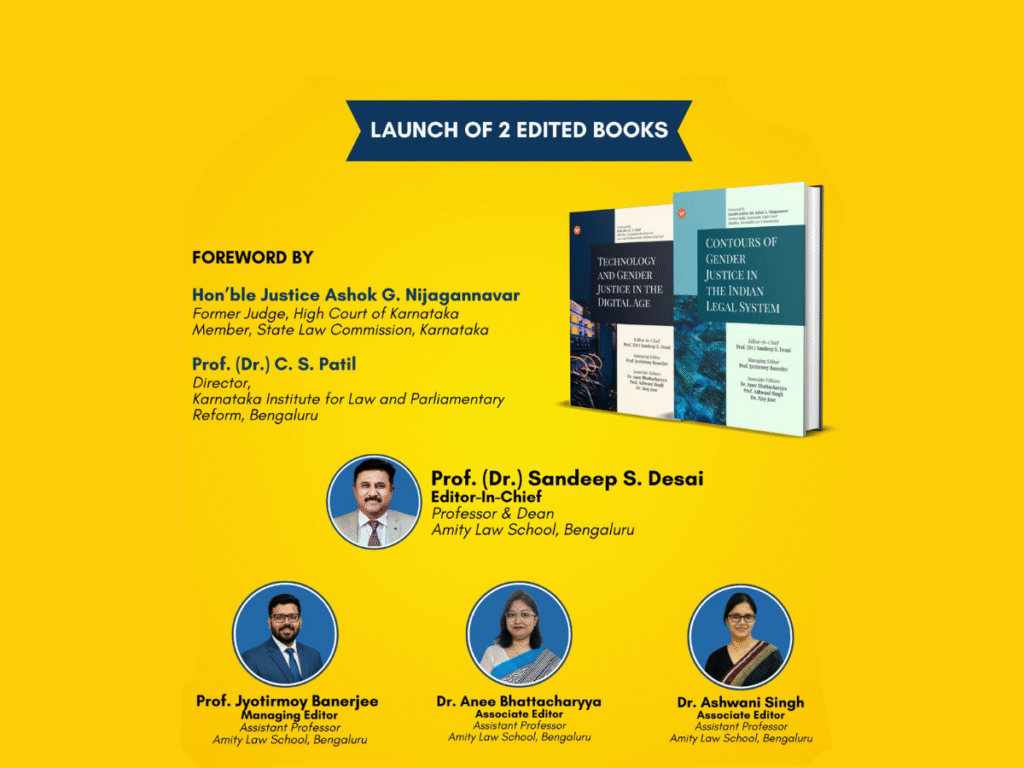A Landmark Moment: Release of Two Edited Volumes at the National Conclave on Law, Gender and Society

Release of Two Edited Volumes at the National Conclave on Law, Gender and Society
Prof. (Dr.) Sandeep S. Desai, Jyotirmoy Banerjee, Dr. Ashwani Singh, and Dr. Anee Bhattacharyya
In an academic journey, there are moments that transcend individual achievement and become markers of collective intellectual progress. Such milestones do not merely celebrate personal growth; they embody the contributions of entire scholarly communities that nurture, challenge, and sustain us. I am humbled and delighted to share one such milestone: the release of two Edited Books in our name during the National Conclave on Law, Gender and Society, organized by Amity Law School, Amity University Bengaluru, on 19th September 2025. These volumes, published by Writersgram Publications, a reputed national publisher based in New Delhi, represent years of collaborative effort, dialogue, and rigorous scholarship.
These books are not only personal achievements but also institutional milestones. They demonstrate what is possible when committed scholars pool their expertise to examine pressing socio-legal concerns. The editorial process was meticulous, involving countless hours of review, reflection, and constructive debate. The outcome is a pair of volumes that stand as testaments to the continuing engagement between law, gender, and society, and the determination to expand these conversations beyond disciplinary and institutional boundaries.
The Conclave as a Platform
The National Conclave on Law, Gender and Society 2025 provided a fitting platform for this release. The event itself was an extraordinary confluence of minds, drawing together jurists, senior academicians, researchers, students, and social leaders. Its focus was to re-examine the intersection between gender and law with both honesty and intellectual rigour, to highlight how our legal frameworks must adapt in pursuit of inclusivity and justice.
The Conclave began with an inaugural session graced by Hon’ble Justice Ashok G. Nijagannavar, Former Judge of the High Court of Karnataka and Member of the State Law Commission, Karnataka. His address powerfully reaffirmed the constitutional mandate of equality, reminding us that rights, while enshrined in statutes, find life only through judicial interpretation and enforcement. Prof. (Dr.) C.S. Patil, Director of the Karnataka Institute for Law and Parliamentary Reform, emphasized the urgent need to embed gender sensitivity in legal education. He persuasively argued that the classroom is where gender justice begins, for it is here that future lawyers and judges cultivate values of equality and fairness.
Adding a voice of lived experience, Dr. Akkai Padmashali, Karnataka Rajyotsava Awardee and noted transgender activist, spoke with great conviction about the daily realities of marginalised communities. Her address challenged the audience to move beyond abstract ideals and recognize gender justice as something that must be practised in the everyday, not merely theorized in courts or classrooms. The academic panels sustained this energy. The first panel, “Engendering the Gender”, featured Prof. (Dr.) K.R. Aithal, Former Vice Chancellor of Karnataka University, Dharwad, alongside Dr. Debangana Chatterjee of NLSIU Bengaluru. Their discussion highlighted the socio-legal dimensions of gender identity and the evolving jurisprudence of inclusivity.
The second panel, “Laws of, by, and for the Gender”, gathered distinguished voices such as Prof. (Dr.) Sairam Bhat (NLSIU Bengaluru), Prof. (Dr.) D. Jeevan Kumar (Bangalore University), and Prof. Parvez Lamba (RV University). This session critically examined statutory reforms and institutional frameworks, urging participants to rethink governance through a gender-just lens. Against this backdrop of intellectual exchange and lived testimony, the release of our edited books was not merely ceremonial. It was deeply substantive — a continuation of the very themes the Conclave sought to address.
The Significance of the Edited Volumes
Edited volumes hold a unique position in legal scholarship. Unlike single-authored monographs, they bring together a plurality of voices, reflecting diverse methodologies, perspectives, and lived realities. This diversity is essential when dealing with subjects as layered as law and gender, where experiences and interpretations differ across communities and contexts. The two volumes released at the Conclave, edited by Prof. (Dr.) Sandeep S. Desai, Jyotirmoy Banerjee, Dr. Ashwani Singh, and Dr. Anee Bhattacharyya, illustrate this collaborative spirit.
The first, Technology and Gender Justice in the Digital Age, grapples with the profound challenges posed by technological advancement. It explores urgent themes such as online harassment, algorithmic bias, data privacy, and the digital divide — issues that disproportionately affect women and marginalized communities. This book situates digital transformation within constitutional debates on equality and dignity, making it both timely and necessary.
The second, Contours of Gender Justice in the Indian Legal System, offers a wider socio-legal perspective. It engages with family law, constitutional interpretation, criminal law, and labour rights to map the evolving jurisprudence of equality in India. This volume interrogates the enduring barriers to justice faced by women, LGBTQIA+ persons, and other vulnerable groups, while also pointing toward possibilities of reform.
Together, these volumes span both the emerging frontiers of digital regulation and the core foundations of Indian legal practice. They are designed to serve multiple audiences — as structured entry points for students, critical resources for practitioners, and policy-oriented reflections for lawmakers.
Why This Moment Matters Personally
For me, the release of these books is a landmark moment in my academic journey. Scholarship is often viewed as solitary work — a researcher in a study, a scholar at a desk — but edited volumes remind us that true intellectual progress is collective. They thrive on dialogue, debate, and the willingness to weave together multiple strands of thought into a coherent whole. To see my name associated with such distinguished co-editors and to witness the culmination of months of collaborative effort fills me with gratitude and pride. These books will not only occupy a place in libraries but, I hope, also in classrooms, courtrooms, and policymaking circles.
What excites me most is their potential impact. For example, a law student might use a chapter on gender justice in family law to challenge discriminatory practices in moots or in early litigation. A researcher might take inspiration from an essay on constitutional equality to develop a doctoral thesis. A policymaker might consult a comparative study on gender inclusivity in education while drafting reforms. The ripple effects of scholarship are difficult to measure but profoundly real.
Looking Ahead
The Valedictory Ceremony of the Conclave, addressed by Prof. (Dr.) D. Jeevan Kumar and Prof. (Dr.) Sairam Bhat, underscored that this event was a beginning, not an end. Scholarship, by its very nature, is iterative: today’s books spark tomorrow’s debates, which in turn inspire new research, reforms, and volumes.
I see these two edited books not as endpoints but as contributions to an ongoing dialogue between academics, practitioners, judges, and activists. Our collective responsibility is to ensure that law does not remain static but evolves in tandem with society’s aspirations.
Gratitude and Reflection
Such achievements are never solitary. I owe deep gratitude to my co-editors — Prof. (Dr.) Sandeep S. Desai, Jyotirmoy Banerjee, Dr. Ashwani Singh, and Dr. Anee Bhattacharyya — whose commitment and expertise shaped these books into reality. The contributors, whose scholarship animates the volumes, deserve equal recognition.
I am also grateful to Amity University Bengaluru for providing a platform where scholarship and social dialogue could intersect so meaningfully, and to Writersgram Publications for their faith in this project. Above all, I thank my students and colleagues, who constantly challenge me to think harder, question deeper, and aspire higher. These books are as much theirs as they are mine.
Closing Thought
The release of these two edited volumes at the National Conclave on Law, Gender and Society was more than a celebratory moment. It was a reaffirmation of why we pursue scholarship: to generate knowledge, foster dialogue, and inspire transformation. As I reflect, I am reminded of Justice V.R. Krishna Iyer’s timeless words: “Law without justice is a wound without cure.” My hope is that these volumes, Technology and Gender Justice in the Digital Age and Contours of Gender Justice in the Indian Legal System, represent small but significant steps toward ensuring that justice — especially gender justice — remains central to law’s practice and study.
This milestone strengthens my resolve to continue the journey of research, collaboration, and dialogue, with an enduring belief in the transformative power of the written word.




